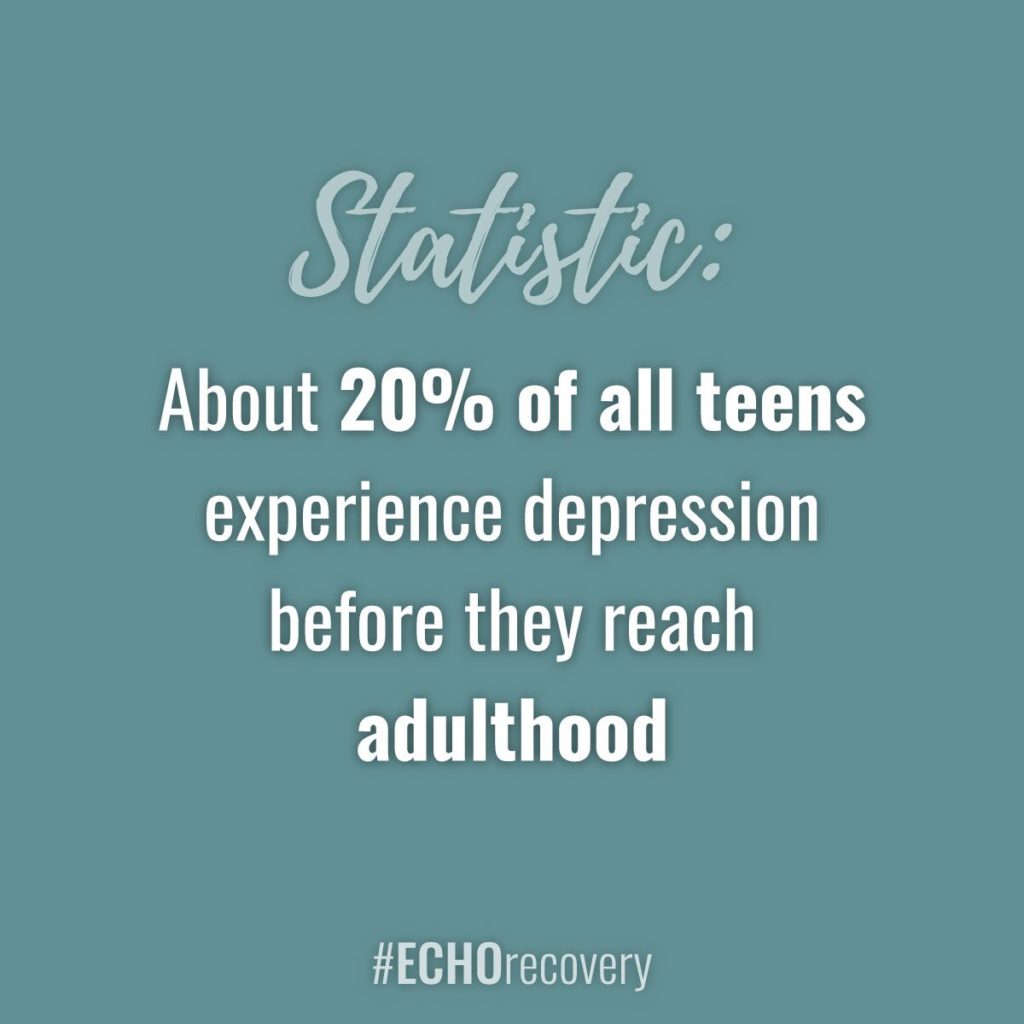One Picture of Anxiety in Millennials
Seventeen-year-old Hannah Baker took her own life in her bathroom, leaving her distraught parents to find her lifeless body and wonder why. Hannah defined the why by making an audio diary on 13 cassette tapes and asking that they be circulated among those she holds responsible for her suicide in the Netflix show (and preceding novel) “13 Reasons Why.”
Hannah is a beautiful, smart girl with loving parents and a bright future. And yet, like so many of our teens in the U.S., she kills herself. The decline into anxiety and depression — terms used interchangeably by today’s teens — is a grading slope of despair.
Suicide doesn’t happen because of just one thing, one emotion, one event. Depression is a subtly dangerous illness that gradually takes over.
Though Hannah Baker’s story is fictional, the depth of pain from the epidemic of teen depression is all too real for many families today.
In fact, today’s teens and younger millennials are struggling with anxiety and depression more than any previous generation on record. Studies show millennials suffer from anxiety at a much higher rate than preceding generations. Subsequently, the suicide rate among adolescents in the U.S. is climbing more than ever.
Millennials and Depression
Suicidal tendencies are a marker of depression and anxiety. Much has been documented about millennials being delicate and having many worries despite having protective helicopter parents.
Studies do not provide a definitive answer as to why there is this continuing rise in depression in adolescents and young adults; however, mental health professionals speculate several factors contribute to the issue:
- Many experts say teens are using more drugs and alcohol, which cause mood changes, anxiety and depression.
- An electronically based society, with almost everyone owning a smartphone.
- Growing up among so many school shootings.
- Worry for one’s family finances.
Some professionals say we are raising our kids with unrealistic expectations and that having a kid-centered culture has shielded them from learning how to deal with the normal challenges of life. Raising our children with the idea they can do anything, meanwhile providing everything, fosters an era of entitlement.
Is Entitlement to Blame?
Modern society teaches young people that their possibilities are endless. However, the blessing of limitlessness brings with it the curse of too many choices, paralyzing the individual who has anxious tendencies.
In some cases, this kind of upbringing facilitates an entitlement attitude. This is a mindset of deserving everything without putting forth the effort to achieve it. As children grow into adolescents and young adults, thoughts of not being good enough to attain all that we expect of them and facing a life of making it on their own are overwhelming.
In many ways, there is more stress now than in previous generations. Stress triggers depression, anxiety and mood disorders.
During the difficult time of hormonal and brain changes during adolescence, most teens experience some symptoms of depression and anxiety from time to time. If a teenager is predisposed to mental health issues due to genetics, his or her risk of depression, anxiety, drug and alcohol issues increases.
Millennials: Depression Stats
The Centers for Disease Control and Prevention routinely conducts the Youth Risk Behavior Surveillance System (YRBSS) survey, which monitors unhealthy and risky behaviors among youth and young adults. Behaviors that indicate depression and/or suicidal ideation are included.
Here are some facts gathered by the YRBSS regarding anxiety and depression in adolescents and young adults:
- Suicide is the second-leading cause of death in people aged 10 to 24 years old.
- American students in grades 7 through 12 make an average of 5,240 suicide attempts per day.
- More people die of suicide than homicide in the U.S.
- Only 30 percent of depressed teens are getting treatment.
- Suicide-related behavior among American teens has steadily increased from 2009 to 2017.
Another study conducted by Jean Twenge, Ph.D., professor of psychology at San Diego State University, shows that 5 times as many high school and college students deal with anxiety now than the same age group did during the Great Depression!
The Impact of Screen Time
Modern lifestyles – less family support, living with fewer people, less exercise, less outdoor sun exposure and more computer/phone time – play a huge role in changes from traditional values toward more mental health problems.
The impact of screen time on our youth contributes to anxiety in the following ways:
- Social media encourages insecurities: Cyber bullying, slander, comparing oneself to others, and the feeling of needing to look perfect online all contribute to low self-esteem and insecurity.
- When adolescents and young adults want to avoid the stress of real life, school or interactions with real people, they can easily escape into their smartphones.
- It is a known fact that the use of electronic devices for more than 2 hours a day creates mild depression.
This is not an all-inclusive list, as much has been written about the effects of the use of electronic devices among young people.
Risks for Drug and Alcohol Abuse and Addiction
 Because of the increased rates of depression and anxiety among today’s youth, our young people are more at risk of self-medicating and addiction than ever. More and more addiction treatment centers are offering programs focused on addressing anxiety in adolescents and young millennials to meet the needs of our current climate.
Because of the increased rates of depression and anxiety among today’s youth, our young people are more at risk of self-medicating and addiction than ever. More and more addiction treatment centers are offering programs focused on addressing anxiety in adolescents and young millennials to meet the needs of our current climate.
The pain of anxiety and depression in young adults drives many to self-medicate. It is difficult for someone suffering with depression to reach out for help. Millennials look to ease their pain any way they can, often turning to substances to make them feel better. At a young age, it is easy to find peers using drugs or getting alcohol underage.
For lack of better options or the embarrassment of coming forward to acknowledge their anxiety, adolescents that start using substances to relieve psychological pain can easily become addicted. Alcohol, illicit drugs and prescription drugs carry a high risk of abuse and addiction.
If someone with anxiety or depression develops an addiction, they will have what is called a dual diagnosis. These kind of cases requires specialized treatment for both issues.
Higher Risk Factors for Teen Depression
Some teens have higher-than-average risk factors for depression, addiction and suicide. In addition to a genetic predisposition as previously mentioned, some of these factors include:
- Having a psychiatric illness without receiving adequate treatment — the highest risk for suicide
- Being abused or neglected
- Suffering from chronic illness
- Family history of mental illness
- Regularly consuming alcohol
- Regularly using illicit or prescription drugs
Warning Signs and Symptoms
Do you worry that your teen or young adult child might be struggling with depression, anxiety or a related psychiatric disorder? Sometimes it can be difficult to distinguish between what is normal moody behavior and when something is truly awry.
There are some warning signs and symptoms to look for in your child or loved one:
- Sadness or hopelessness
- Drug or alcohol use
- Low self-esteem or acting overly self-conscious
- Eating disorder symptoms or not caring about appearance (lack of hygiene or changes in appearance)
- Problems in school (lower grades, getting in trouble)
- Scars, self-harm or cutting
- Lack of interest in activities and alienating oneself from people
- Interest in or talking about death
This is not a comprehensive list of warning signs. Anytime you have concerns about these symptoms or others, do not hesitate to ask questions. When it comes to mental health issues, drug and alcohol abuse or potential suicide, it is always better to be safe than sorry.
Getting Help
Depression and anxiety are serious conditions. Threats of suicide should always be taken seriously.
If you need personally need help for depression or suicidal thoughts, call the National Suicide Prevention Lifeline at 1-800-273-8255 or call 1-800-SUICIDE.

Experienced Chief Executive Addiction Recovery and Mental Health Professional
Business professional in the Addiction Recovery and Mental Health industry for the past 26 years. Caring, compassionate and strongly motivated to make a difference in the organizations I am affiliated with and welfare of the population we serve. Currently focused on advocating, educating and developing projects leveraging evidence based, real time technology to support individuals in recovery.


